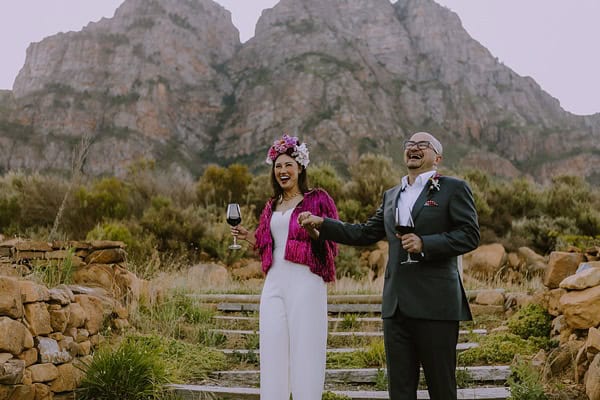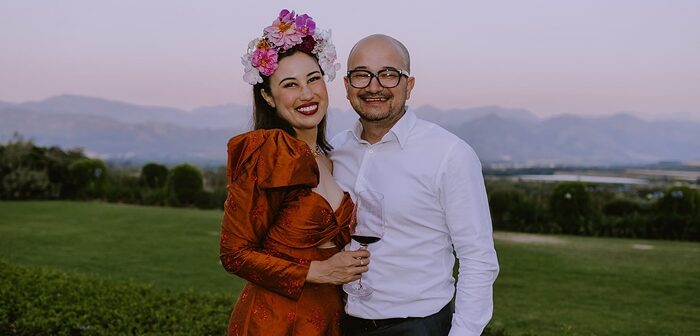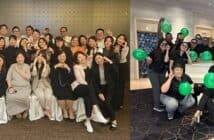Discover the enchanting magic of South African wines with Message In A Bottle—a specialised distributor founded by newlyweds Annette and Mark du Plessis. They are excited to present their thoughtfully curated collection of exceptional wines from award-winning family-run wineries. Each bottle holds a unique message and a captivating story that unfolds from the very land it originates, through the vine, and into the hands of the dedicated people behind it all. With immense pride, they introduce three exclusive allocation wines, exemplifying the acclaimed craftsmanship that defines South African winemaking. One such gem is ‘The 1947,’ crafted from grapes sourced from the second oldest Chenin Blanc block in South Africa, making its grand debut on June 16th, celebrated as International Chenin Blanc Day.
South Africa, often referred to as the “Rainbow Nation,” is renowned for its dynamic culture and rich history. On the global stage, it is increasingly recognised as a premier wine-producing country. The Cape winegrowing regions, situated within the narrow viticultural belt of the Southern Hemisphere, enjoy a Mediterranean climate and a fertile habitat, resulting in an abundance of award-winning wines.
Annette and Mark take immense pride in serving as Messengers for the remarkable experiences offered by South African wines. Within Message In A Bottle’s portfolio, you’ll find winemakers from 1st to 4th generation legacies, who have perfected their craft over decades, resulting in wines that have earned numerous prestigious industry accolades and awards. Their careful curation focuses on selecting only the most exquisite wines that showcase the distinct terroirs and exceptional craftsmanship unique to South African winemaking.
From luscious, fruit-forward reds to crisp, invigorating whites, each bottle narrates a distinctive tale of passion, heritage, and a profound connection to the land. As dedicated Messengers, Annette and Mark open the door to the world of South African wines through Message In A Bottle, offering direct access to the country’s most intriguing winemakers and spectacular vineyards, bringing affordable wines with captivating stories for a wondrous experience. Mark du Plessis hails from Cape Town and is driven by a deep passion for sharing the extraordinary flavours and stories of South Africa with the global audience.
We speak to Annette and Mark du Plessis, the founders of Message In A Bottle, to learn more about how they come up with the name for their venture, the unique characteristics and qualities of South African wines, what makes these wines appealing to wine enthusiasts in Singapore, as well as their upcoming plans and more. Keep reading to find out.
Interview with Annette and Mark du Plessis, Founders of Message In A Bottle
1. What inspired you to start a business as a specialised distributor for South African wines in Singapore? How did you get started in this industry, and what motivated you to focus specifically on South African wines?
Annette: As individuals, we are both curious and restless. I had the good fortune of being served a beautiful glass of Chenin Blanc on my first trip to Cape Town which was to visit Mark’s family as we were planning to get married. During the wedding prep, we visited many different vineyards – I never paid attention to wines nor to South Africa before this. I consumed wines from time to time in Singapore during meals, but that glass of Chenin Blanc awoken my senses and going around the different vineyards also exposed to me the incredibly delicious wines South Africa had to offer. It was also so accessible!
After we got married, we thought about the future and knew that our family unit wasn’t going to be extending beyond us – this caused a little bit of anxiety for me. What are we going to do for the rest of our shared lives, I thought! In that moment of anxiety, I instinctively knew that we needed a special project to dedicate ourselves to. The decision to get into the wine business was very intuitive – We like it. We like what South Africa has to offer, it gives us a way to stay connected to the land, it gives us something to nurture and grow as we get old (so much wine, so little time!), so.. let’s just do it!
Mark: I grew up in Cape Town and left when I was 27 to explore the world. I wasn’t much of a wine drinker back then to be honest, much like many young men at that time I preferred a 10 year old KWV brandy instead! I only returned to Cape Town just before COVID hit and realised I had missed it very much. I felt connected again. There is something unique and magnificent about the Western Cape so this wine business is a logical way to stay connected to my birthplace.
2. How did you come up with the name Message in A Bottle and what are the challenges that you faced when starting up the business and how did you overcome them?
Annette: We understood that part of what we’d need to do for the business is to help people have a better understanding of wines, and of wines from South Africa, through information and stories. We were going back and forth on some names we had in mind that could communicate this intention when one day, I stepped out of the shower singing the song “Message in a bottle” and viola! A name was born. We also found that it could encapsulate our mission very well, so we landed on the name almost by accident, but it worked out very well for us.
Mark: We view our producers as the heroes in this story. Each of them has a reason for doing what they do and producing things how they do it. This is why we decided to feature them first and we are just the “messengers”.
The “mechanics” of setting up a business in Singapore are really easy. The government is very supportive and innovative so that was done very quickly. Banks, on the other hand, are not that easy. We were rejected by almost all banks because of being classified as “high risk” even though it was our own money we invested into this! There is no way to overcome this – you just need to breathe and wait. Also apart from enjoying wine, we knew nothing about wine production, how global shipping schedules work, logistics and duty-suspended storage, restaurant needs vs consumer needs. We had to learn all of this and we were saved by finding the right partners, recognising we knew nothing and just having the persistence to ask what must have seemed like stupid questions. Ego-busting for sure, but so much fun learning.
3. The vineyards in Cape Town are renowned for their stunning landscapes. Could you share a particular aspect that stands out to you, showcasing the unique bond between the vineyards and the beautiful surroundings of your hometown?
Mark: All the winelands in the Western Cape are linked by 2 things – Mountains and Oceans. If you’ve been there you know that the landscape is dominated by massive mountain ranges, which are windswept from strong winds blowing from the Atlantic and Indian oceans. These are the oldest viticultural soils in the world, traceable back over 1000 million years. 95% of Cape wines are produced in the Cape Floral Kingdom, a UNESCO World Heritage Listed area. It is home to 9600 species of plants, more than the entire Northern Hemisphere.
4. Singapore is known for its diverse culinary scene. How have you witnessed the growing interest in South African wines among Singaporean consumers and businesses? What factors contribute to their appeal in this market?
Annette: We typically get 2 types of responses to South African wines. The first from people who are familiar with South Africa as a wine producing country, the other from people who have no idea that South Africa is one! In both, people are curious to try some.
The reputation of South African wines are growing, albeit slowly. There is still a lot more education to be done to raise the profile to levels such as in the UK or US.
5. As a specialised distributor, you have access to a wide range of South African wines. Could you share some insights into the unique characteristics and qualities that set these wines apart from others? What makes them a compelling choice for wine enthusiasts in Singapore?
Mark: South African wines cover a wide range of styles of wine making styles. It must be remembered that South Africa has been making wine since 1659, which is as long as some of the countries labelled as Old World. South Africa has the advantage of not having Old World regional restrictions, which has sparked innovation and allows us to be truly driven by the terroir. In the last few decades (in particular, post-Apartheid) there has been a focus on reducing quantity produced to focus on quality and sustainability through initiatives like Old Vine Project https://oldvineproject.co.za.
The landscape and ocean winds mean we can go from cool to hot climate styles. If you want a fresh, crisp Chardonnay from a cool climate, a light delicate Pinot Noir through to a traditional Bordeaux-style blend, we have you covered. Many of the producers also create Cape Blends, which are Bordeaux-style blends including our own grape, Pinotage. These can be big and bold. In terms of white grapes we will always go back to Chenin Blanc. It’s very widely grown in South Africa and can be fresh and fruity to complex, rich and full. South Africa also makes fantastic sparkling wines. Due to financial agreements in the early 1900s, we cannot use the term “Champagne” to describe them, but rest assured all sparkling wines which are labelled “Cap Classique” are strictly made using the classic Methode Champenoise, the same method used in Champagne.

6. Building strong relationships with wineries and producers is essential for a distributor. How do you go about selecting and partnering with South African wine producers? Are there specific criteria you look for to ensure the quality and authenticity of the wines you distribute?
Annette: As a family run business, we’re also inclined to work with other family run, boutique producers. We like the idea of our family growing together and alongside theirs. Naturally, we also do the various checks – for quality, awards, ratings. We taste test all the wines we sell and we only sell the wines that we believe truly punch above their weight in terms of quality.
7. Singapore is a competitive market with many wine options available. How do you position and differentiate your selection of South African wines to capture the attention and interest of consumers? What marketing and promotional strategies do you employ?
Annette: We are cognisant that we are a young business – but we do see glaring gaps where much can be done in terms of helping people choose a great wine through access to information. This means telling the story of the wines, the wine makers, the vineyards, and of South Africa. Through these stories, we hope our buyers will be able to more informed decisions about what wines to buy, in general, and why our wines make a lot of sense in their purchase decisions!
8. Wine education and tastings can play a crucial role in creating awareness and appreciation for different wine varieties. Do you organise any educational events or wine tastings to introduce South African wines to consumers and businesses in Singapore? How do these events contribute to your overall distribution strategy?
Annette: We do host wine appreciation sessions with corporates and are open to any collaborations. I would love to work with local hawkers to do a series about which hawker dishes pair well with our wines! For the most part, we’re looking to raise awareness through our website and our social channels because we want to share information openly and freely so the barrier of entry is low and consumers can comfortably chart their own exploration journey with wines and South African wines at their own pace, in their own space.
9. Sustainability and eco-consciousness are increasingly important in the wine industry. Do you work with any South African wineries that prioritise sustainability practices? Can you share any examples of their initiatives and how they align with your own values as a distributor?
Annette: Most of our Producers are looking after land that has been in their family for generations – they are acutely aware of how they care for their land. 3 out of 4 of our wine makers adhere to The Guidelines for the Integrated Production of Wine (IPW) which is the environmental sustainability scheme established by the South African wine industry that provides buyers with a guarantee that grape production was undertaken with due consideration of the environment, and that the wine was produced in an environmentally responsible manner.
10. Distribution logistics can be challenging, especially when dealing with international shipments. How do you ensure the timely and safe delivery of South African wines to Singapore? Are there any notable measures you take to maintain the integrity of the wines during transportation?
Annette: We always ask our Producers for their recommendations – Partners in the industry that they like to work with, for a start. Recommendations go a long way in this highly relationship-based industry.
Mark: It took us a few attempts to settle on a complete supply chain which understood how to work with wine. None of our producers had shipped to Singapore before so we had a few recommendations to try. These days, from the producers to the bonded warehouse in Singapore we only use shippers and logistics companies who offer specialized wine services like temperature controlled shipping, ground transport and warehousing.
11. Looking to the future, what are your goals and aspirations as a specialised distributor for South African wines in Singapore? Are there any upcoming initiatives or projects that you are particularly excited about?
Annette: When we first started thinking about the business, we were keen to run a podcast program to tell the stories we need to tell (about wines, our wine makers, and of South African wines). This also allows Mark to combine yet another one of his interests (in music production) with this passion in Wine. That is still something we’re very keen to do… at some point!
12. Lastly, is there anything else you’d like to add and what would you like to say to our readers who are looking forward to trying out the wines at Message in A Bottle?
Annette: We’re happy to give recommendations for anyone who is curious but cautious. It’s as easy as giving us a ping on Whatsapp. We’d ask some questions and that will help us give a recommended that can work well for the individual.
Let the love story of South African wines unfold with every sip through Message In The Bottle.
For more information about the wines and to purchase them, please visit https://messageinabottle.sg





2 Comments
Enjoy reading this interview feature, good to know more about South African Wine!
Keep up the good work!